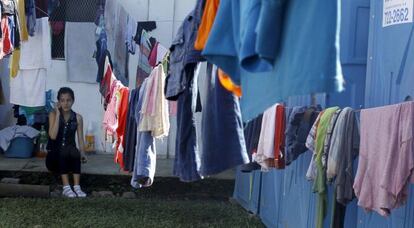Central America comes up with plan to evacuate stranded Cuban refugees
Crisis escalated after Nicaragua refused to let the migrants cross over from Costa Rica

Government officials from several Central American nations have come up with a pilot plan that would allow stranded Cuban refugees on Costa Rica’s border with Nicaragua to travel by air to El Salvador and continue their journey to the United States by land through Guatemala and Mexico.
The Cubans want to take advantage of a 1966 law, which gives them special legal status if they make it to US soil
“We have agreed to undertake the first humanitarian pilot program during the first week in January. For that reason, we have appointed a working committee which will be responsible for coordinating this first transfer,” the Guatemalan Foreign Ministry said in a statement after officials from several different countries met behind closed doors to iron out a new plan.
The crisis grew after the Nicaraguan government shut its common border with Costa Rica and refused to allow the Cubans to cross over last November.
In a statement issued by the Costa Rican Foreign Ministry, the government in San Jose said that the Cubans will avoid passing through Nicaragua and instead be flown directly to El Salvador. The details of the plan were not made public to ensure the safety of the Cubans.
Nicaragua had accused Costa Rica of trying to dump thousands of Cubans into the country without proper travel documents in violation of international treaties. The Cuban refugees arrived in Ecuador by plane and had traveled by land through Colombia and Panama before reaching Costa Rica.
Monday’s meeting between officials from Belize, El Salvador, Honduras, Costa Rica, Panama and Mexico was also attended by representatives of the International Organization for Migration (IOM).
The Cubans are hoping to take advantage of the 1966 US Cuban Adjustment Act, which gives special legal status to Cubans who make it to US soil.
With the normalization of relations between Havana and Washington, many fear that the law may be modified soon and they won’t be able to reunite with their family members in Florida and other parts of the United States.
English version by Martin Delfín.
Tu suscripción se está usando en otro dispositivo
¿Quieres añadir otro usuario a tu suscripción?
Si continúas leyendo en este dispositivo, no se podrá leer en el otro.
FlechaTu suscripción se está usando en otro dispositivo y solo puedes acceder a EL PAÍS desde un dispositivo a la vez.
Si quieres compartir tu cuenta, cambia tu suscripción a la modalidad Premium, así podrás añadir otro usuario. Cada uno accederá con su propia cuenta de email, lo que os permitirá personalizar vuestra experiencia en EL PAÍS.
¿Tienes una suscripción de empresa? Accede aquí para contratar más cuentas.
En el caso de no saber quién está usando tu cuenta, te recomendamos cambiar tu contraseña aquí.
Si decides continuar compartiendo tu cuenta, este mensaje se mostrará en tu dispositivo y en el de la otra persona que está usando tu cuenta de forma indefinida, afectando a tu experiencia de lectura. Puedes consultar aquí los términos y condiciones de la suscripción digital.








































